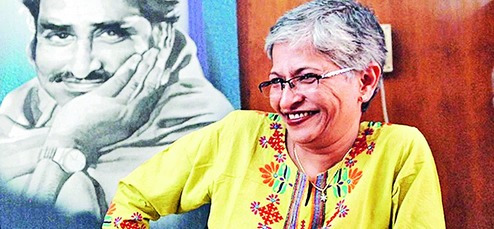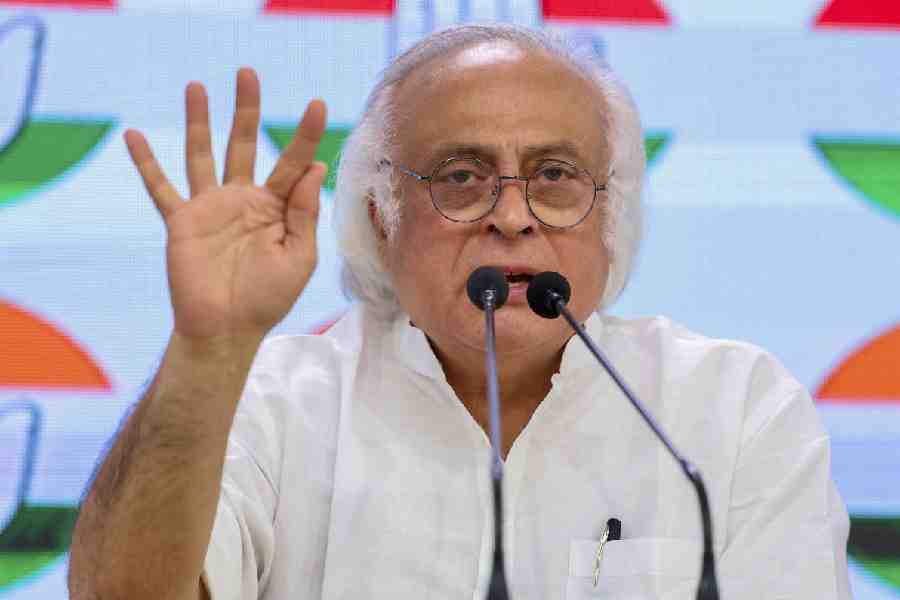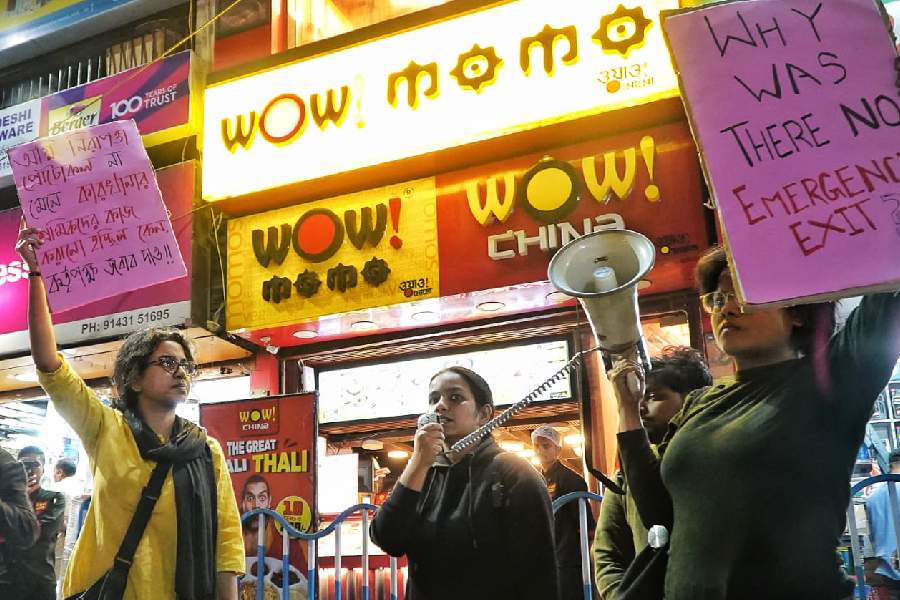
At the core of Gauri Lankesh's fearless journalism and spirited activism lay a profound humanity, a rare ability to nurture and to give.
In the outpouring of grief and anger, in the millions of words written and spoken after she was gunned down at the entrance of her Bangalore home last Tuesday night, two narratives have emerged.
One focuses on Gauri the activist, the relentless critic of the sangh parivar, the doughty crusader against the politics of hate and bigotry, the champion of the rights of the poor and the vulnerable - who used her pen and her voice to call out against all forms of injustice, who provided succour and support to many a cause that seemed lost to others.
The second talks of Gauri the person - warm, generous, fun loving, witty with an infectious sense of humour and an insatiable zest for life. The most moving tribute to the person that was Gauri came from her ex-husband and lifelong friend, Chidanand (Chidu) Rajghatta.
The tribute went viral and touched countless people with its portrait of a unique friendship and of a woman who was - in his matchless words - the "epitome of Amazing Grace."
For those of us who knew Gauri, Chidu's post brought back a flood of memories. Back in the Delhi of the late1980s, we were all part of a loose, shambolic circle of friends - our days spent chasing stories or subbing copy (Chidu was in The Telegraph bureau; Gauri at the Times of India desk), our evenings meeting deadlines in rooms clouded with cigarette smoke, deafened by the now forgotten clickety-clack of furious typewriters; and every now and then meeting at one home or the other for a round of beers and endless banter.
Although Gauri was the daughter of the well-known Kannada writer and iconoclast, P. Lankesh, she wore her legacy lightly. She did not talk much politics in those days but she exuded a certain spunk - her small, slight frame brimming with energy; her hazel eyes always sparkling with intelligence, and sometimes mischief.
But her stand-out qualities even as a 25-year-old was a generosity of spirit and a nurturing instinct. She had no children of her own, then or later, but had a maternal side to her that came alive whenever she visited a friend who had a baby: she could spend hours holding and playing with the baby, even changing his nappies, that his own mother was loath to do.
As for her generosity, she always had time for friends, and even friends of friends - the Lankesh-Rajghatta home turning quickly into a shelter and a refuge for a host of young journalists cutting their teeth in a profession that was still more a calling than a career back then.
Those who never knew Gauri personally, and even many of those who knew her in her earlier avatar before she took over the editorship of her father's famous Kannada paper - Lankesh Patrike - after his death in early 2000, may find a contradiction between the two competing narratives about her, a disjunct between the happy-go-lucky journalist she once was and the crusading activist she was to become.
But the magic of Gauri Lankesh, the meaning of her remarkable life - no less significant than the chilling message of her horrific death - lies in the seamless fusion between the personal and the political; the inextricable entwining of a love of life with a deeply honed social conscience that was so atypical of our class, of our times.
It was not always like this. The middle class in India - for all its vacillations and inconsistencies - was at the forefront of the freedom struggle.
Even after Independence, most notably in the 1960s, men and women from relatively privileged homes chose to break with their middle class and upper caste moorings and become part of progressive movements that swept - in different forms and varying intensities - India and much of the world. The anti-Emergency upsurge also saw the middle class - and journalists in particular - take part in a movement for ideals that transcended the purely personal.
For our generation, the early 1990s was a turning point. The virulently communal campaign that led to the demolition of the Babri Masjid and the anti-reservation movement after the V.P. Singh government's decision to implement the Mandal Commission report brought many ugly truths about the reality of India to the surface.
The ideals of the Constitution - liberty, equality, secularism, social justice - had never been fully realized. But India, we had thought, was a work in progress. That seemed no longer to be the case.
Unlike the 1960s, however, there was no great churning within the middle class about the need to confront the new dangers or meet the new challenges that had appeared on the horizon. In fact, quite the opposite happened. The 1990s also saw the advent of economic liberalization and we became its biggest beneficiaries.
A quarter century of prosperity has made influential sections of the Indian middle class - including the ever burgeoning media - more 'cosmopolitan' and 'globalized' on the surface. We are now at home in glitzy malls and multiplexes; we have acquired a taste for sushi and schnitzel; some of us holiday every year in some exotic country or another.
Yet, like the gated communities of privilege many of us now live in, the middle class mind has become less open, more insular; often narrower and meaner - refusing to engage with larger concerns, and allowing, of late, the hijacking of the Indian republic by the forces of Hindutva.
Gauri chose to be different. Unlike many of us in the English language media, Gauri had strong roots in her native Karnataka, and absorbed rationalist thought, secular convictions and socialist sympathies early in her life. It still took courage to take on the formidable mantle of her father. In the last 17 years, Gauri did not waver once - she became only more passionate in her commitments, more dedicated in her mission to fight for a more just, more equal, more harmonious India.
And it was her innate generosity and compassion, her effervescence and nurturing nature - which we saw in the 'apolitical' Gauri three decades ago - that sustained her activism in the later years. If she was the 'self-appointed godmother' to the children of her friends back then, it was the same maternal side that made her 'adopt' the young student activists - Kanhaiya Kumar and Umar Khalid, Jignesh Mevani and Shehla Rashid, and others whose names we do not know - as her "ideological children" today. And if her love for life manifested in her ability to make and sustain friendships in spite of differences, in her eclectic taste in music and literature in the 1980s, it expanded manifold over the years to embrace a much less privileged, yet infinitely richer, world.
It is a measure of how much the 'middle ground' has collapsed and how much the middle class - and sections of the mainstream media - have retreated from their once progressive impulses, that Gauri is being pilloried for being 'political'. And though her guiding mantra was "the Constitution is my religion" and she abhorred violence, she is now being branded an extremist and a Naxalite.
In old India, it was a badge of honour to be called a radical, a liberal, a progressive - labels that conveyed a readiness to shed one's selfish concerns to fight for a better world. Today, they are words of abuse and any action that questions the status quo or seeks to alter it can be deemed extremist, or worse, anti-national.
There was a time too, not that long ago, when politics was not a dirty word. It was, in fact, incumbent on citizens - and journalists in particular - to be political in the true sense of the term: to take a stand, to give voice to the voiceless, to speak truth to power.
Gauri Lankesh - lone and defenceless, with a frail body but a mighty heart - was shot dead for doing just that. Her death will be avenged only when some of us, many of us, millions of us imbibe a bit of her courage and a lot of her heart...











